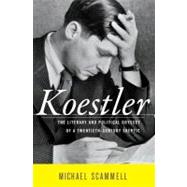
| Prologue | p. xv |
| Koestler Family Tree | p. xxiii |
| A Long Apprenticeship: The Author as Journalist (1905-1936) | |
| Beginnings | p. 1 |
| A Budapest Childhood | p. 13 |
| Rise, Jew, Rise | p. 23 |
| Zionist | p. 33 |
| A Runaway and A Fugitive | p. 46 |
| First Steps in Journalism | p. 56 |
| Hello to Berlin | p. 66 |
| In The Gale of History | p. 77 |
| Red Days | p. 88 |
| Anti-Fascist Crusader | p. 101 |
| Marking Time | p. 116 |
| Prisoner of Franco | p. 125 |
| Turning Point | p. 140 |
| Fame and Infamy: The Author as Novelist (1936-1946) | |
| The God that Failed | p. 155 |
| No New Certainties | p. 164 |
| Darkness Visible | p. 173 |
| Scum of the Earth | p. 183 |
| Darkness Unveiled | p. 193 |
| In Crumpled Battledress | p. 203 |
| The NovelistÆs Temptations | p. 214 |
| Identity Crisis | p. 227 |
| Commissar or Yogi? | p. 238 |
| Return to Palestine | p. 250 |
| Welsh Interlude | p. 262 |
| The Logic of the Ice Age | p. 273 |
| Lost Illusions: The Author as Activist (1946-1959) | |
| Adventures Among the Existentialists | p. 287 |
| French Lessons | p. 299 |
| Discovering America | p. 313 |
| Farewell to Zionism | p. 325 |
| A Married Man | p. 337 |
| To the Barricades | p. 350 |
| The Congress for Cultural Freedom | p. 362 |
| Back to the USA | p. 371 |
| Politically Unreliable | p. 382 |
| The Language of Destiny | p. 394 |
| The Phantom Chase | p. 404 |
| I Killed Her | p. 419 |
| Cassandra Grows Hoarse | p. 427 |
| Matters of Life and Death | p. 443 |
| Astride the Two Cultures: The Author as Polymath (1959-1983) | |
| Cosmic Reporter | p. 457 |
| The Squire of Alpbach | p. 470 |
| Retreat from Rationalism? | p. 478 |
| A Naive and Skeptical Disposition | p. 489 |
| Seeking a Cure | p. 502 |
| Wunderkind | p. 516 |
| Chance Governs All | p. 527 |
| The Koestler Problem | p. 539 |
| An Easy Way of Dying | p. 551 |
| Epilogue | p. 566 |
| Acknowledgments | p. 573 |
| Select Bibliography | p. 579 |
| Notes and Sources | p. 587 |
| Index | p. 667 |
| Table of Contents provided by Ingram. All Rights Reserved. |
The New copy of this book will include any supplemental materials advertised. Please check the title of the book to determine if it should include any access cards, study guides, lab manuals, CDs, etc.
The Used, Rental and eBook copies of this book are not guaranteed to include any supplemental materials. Typically, only the book itself is included. This is true even if the title states it includes any access cards, study guides, lab manuals, CDs, etc.
Excerpted from Koestler: The Literary and Political Odyssey of a Twentieth-Century Skeptic by Michael Scammell
All rights reserved by the original copyright owners. Excerpts are provided for display purposes only and may not be reproduced, reprinted or distributed without the written permission of the publisher.